Submission Deadline
28 February 2026
Judging
Date
24 & 25 March 2026
Winners Announcement
22 April 2026
28 February 2026
24 & 25 March 2026
22 April 2026

The idea for the London Competitions was born from observing a gap in the market. Traditional competitions focused heavily on technical aspects, like aroma or structure, but didn’t necessarily consider what drives consumer preferences. As someone deeply connected to the beverage industry, I wanted to create a competition that mirrors real-world buying decisions.
The three criteria we use—quality, value for money, and packaging—align with how end consumers evaluate products. This holistic approach ensures that the products awarded are not only technically excellent but also marketable and consumer-friendly.
London was chosen as the city to host the awards as it undoubtedly has the best judges with the best palates and has such a true international appeal. We really wanted to reward products not just by quality, but also by value and packaging.
The initial challenge was educating brands and producers on why our model was different and why it mattered. Many producers were accustomed to traditional competitions where points were the primary focus. To overcome this, we emphasized the commercial value of winning our awards.
We showcased case studies and testimonials from brands that saw real sales growth and market traction after winning medals in our competitions. Slowly but surely, the industry began to see how our approach added value to both producers and consumers.
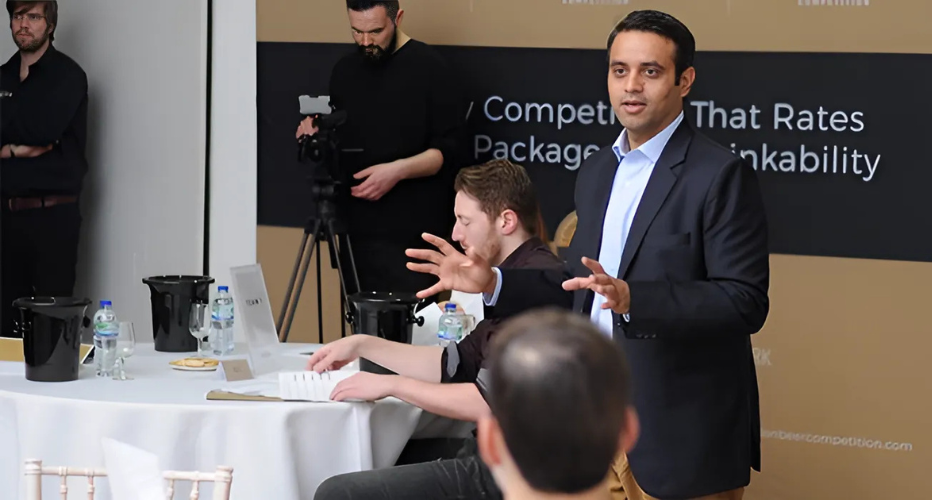
Picture of my first year - 2018
Absolutely, there was skepticism at first. The beverage industry has no shortage of competition, and many producers wondered why they needed to enter yet another one. But the resistance wasn’t so much about the idea of a new competition—it was about differentiating ourselves and proving our value.
Our response was simple: we focused on what sets us apart. We emphasized our unique judging criteria—quality, value for money, and packaging—and how they reflect real-world consumer purchasing decisions. Unlike traditional competitions that are more technical, ours is built to highlight products that will succeed on retail shelves and in restaurants.
Once we started delivering on our promise—producers winning our medals saw better sales traction, distributors took notice of awarded brands, and consumers recognized the medals on shelves—the resistance began to fade. The industry saw that we weren’t just ‘another competition.’ We were providing a commercially relevant platform, and that’s what made the difference.
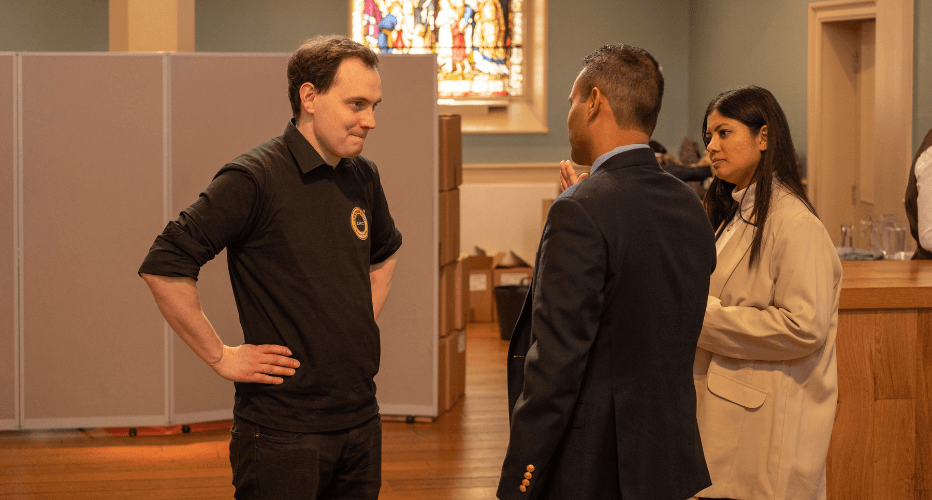
Sid Patel, CEO of LWC and BTN, and Ankita Okate, Global Events Head of BTN do a quick event run check with Donald Mackenzie, floor supervisor to run the competitions.
Yes, engaging with industry professionals was a crucial part of our development process. We conducted extensive discussions with producers, distributors, retailers, and even consumers to gather insights into their experiences with existing competition. A common theme emerged: while traditional competitions focused heavily on technical aspects, they often overlooked factors that directly influence consumer purchasing decisions, such as packaging and value for money. This feedback reinforced our belief that a more holistic approach was needed—one that evaluates products through the lens of the end consumer. By incorporating these insights, we designed the London Competitions to assess quality, value, and packaging, ensuring that the awards resonate with both the trade and consumers.
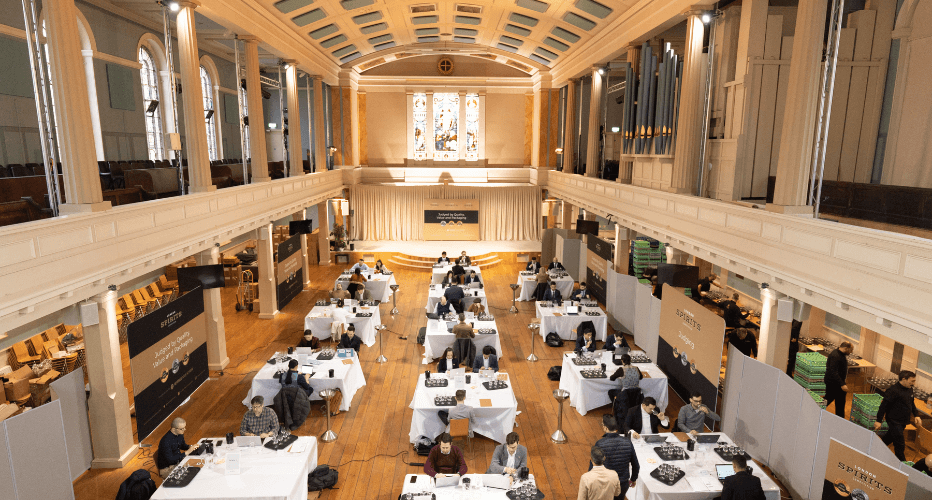
The pandemic was undoubtedly one of the toughest challenges the hospitality and beverage industries have faced. For us, the focus was on adaptability and staying connected to the needs of the industry. We knew that producers, brands, and distributors were facing immense pressure, so our approach was to make the competition as accessible and relevant as possible during that period.
Firstly, we introduced remote judging protocols. While traditionally all judging happens in person, we created a hybrid model where our panels could evaluate products while maintaining safety protocols. It was challenging but necessary, and it allowed us to keep the competitions running without compromising the integrity of the awards.
Secondly, we leveraged the digital presence of the competitions to help brands stay visible. With trade shows and physical events canceled, our platform became a key way for producers to showcase their products to buyers and consumers. We also enhanced our marketing efforts to highlight medal winners, ensuring they could continue reaching their target audiences despite the limitations of the pandemic.
Lastly, we focused on supporting the industry. Through the Beverage Trade Network, we hosted webinars, virtual tastings, and educational sessions to help producers and businesses navigate the challenges. We also launched content aimed at helping brands adapt their sales and marketing strategies for the post-COVID world, particularly as e-commerce became a lifeline for the industry.
In the end, it was about staying agile and focused on our mission—to support the beverage industry in both good times and bad. Those years were difficult, but they also showed the resilience and creativity of this industry, and we were proud to play a part in helping it move forward.
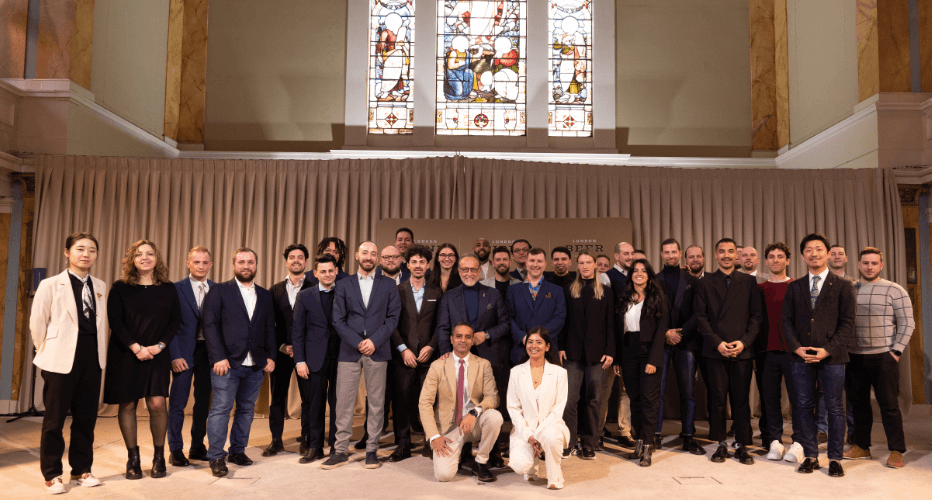
My elevator pitch is simple: “We help you stand out in a crowded market by evaluating your product the way a consumer does—on quality, value for money, and packaging. Winning a medal with us means your product not only tastes great but is also marketable and ready for success.”
For drinks companies that are hesitant, I focus on the commercial value of the awards. The truth is, it’s not just about adding a medal to your bottle—it’s about what that medal represents. Retailers, distributors, and even consumers trust that a London Competition medal indicates a product that delivers on all fronts.
I also highlight success stories from previous winners who used their medals to secure new distributors, increase retail placements, or boost sales. The competitions are not just a badge of honor—they’re a tool to differentiate your brand and drive real business results.
Lastly, I emphasize the credibility of our judging panel. The people evaluating your product are industry leaders—buyers, sommeliers, and market experts who understand what sells. When they award your product, it’s not just an accolade; it’s a stamp of approval from the industry itself.
For producers still unsure, I often say: “Think of it as an investment in your brand. One medal could open the door to countless opportunities.” That usually resonates.
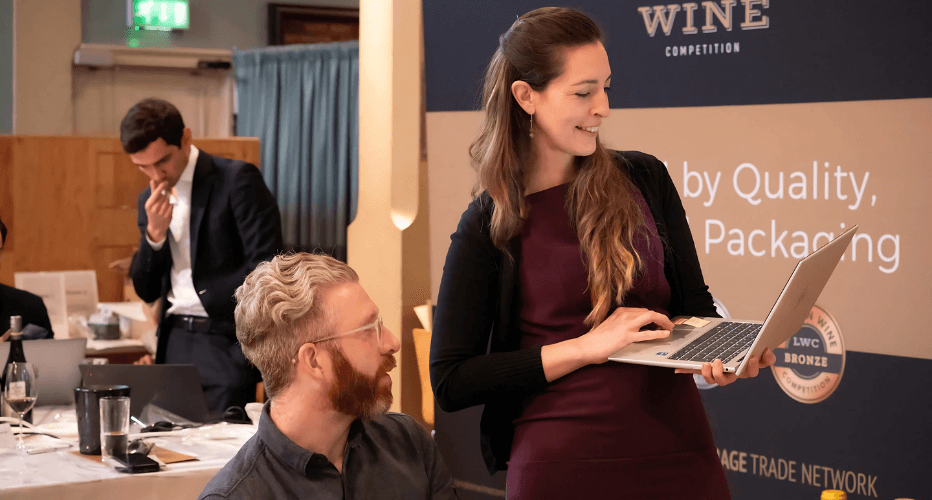
The decision to evaluate quality, packaging, and price came from recognizing a key gap in how traditional competitions operate versus how consumers actually make purchasing decisions. Most competitions focus solely on technical aspects of the drink—aroma, taste, and structure—which are, of course, important. But in the real world, those elements are only part of the equation.
Consumers don’t taste the drink before buying it. They make their initial decision based on the packaging—how appealing the bottle looks on the shelf or online. Then, they consider the price. Does it offer value for money compared to other options? These factors, combined with the drink's quality, ultimately determine whether a product succeeds in the market.
We spoke with industry stakeholders—retailers, sommeliers, and distributors—who all emphasized these elements in their buying decisions. This feedback made it clear that a competition that mirrored real-world decision-making would provide more practical value to producers.
By including packaging and price in the judging criteria, we created a competition that aligns with market realities. It’s not just about awarding medals; it’s about identifying products that are ready to perform in competitive retail and hospitality environments. That’s what makes the London Wine, Beer, and Spirits Competitions unique—and why our winners see real, tangible benefits.
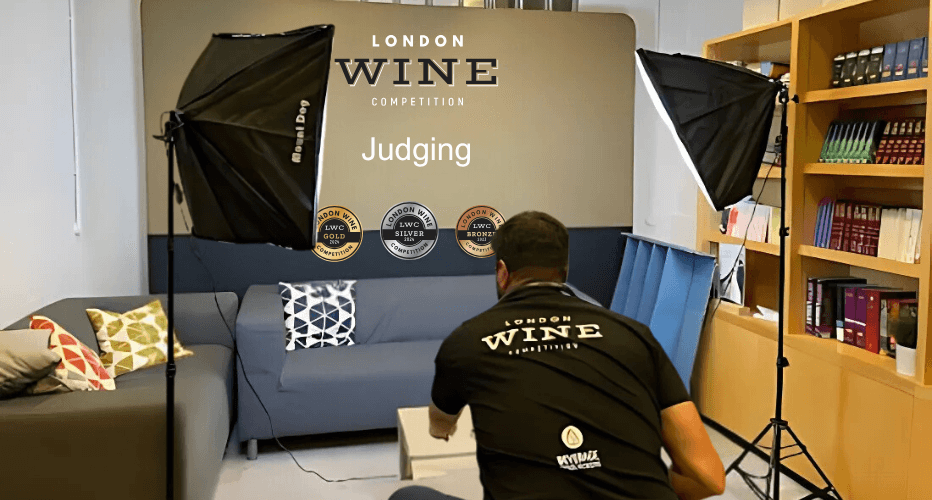
A behind the scene interview where product pictures to product videos are filmed.
One of the biggest lessons I’ve learned is just how dynamic and resilient the drinks trade is. The industry is constantly evolving, shaped by consumer preferences, economic trends, and global events like COVID-19. What remains consistent, though, is the passion and creativity of the people behind it—from producers to distributors and retailers.
I’ve also learned that the trade is increasingly consumer-driven. It’s no longer enough to simply have a great product; you need a strong story, eye-catching packaging, and competitive pricing. Consumers have more choices than ever, so understanding how they think and buy is crucial for success.
Another key takeaway is the growing importance of digital marketing and e-commerce. Since launching, I’ve seen brands that embraced these channels thrive, while those that resisted struggled to keep up. This trend was accelerated by the pandemic and continues to shape how the industry operates.
From a competition perspective, I’ve learned that producers value platforms that offer more than just medals. They want tools and insights to help them succeed—whether that’s market exposure, feedback from judges, or connections to buyers. This has reinforced our mission to provide not just recognition but also real-world value to our participants.
Finally, I’ve seen the importance of collaboration. The drinks trade isn’t just about competition; it’s about building relationships, sharing knowledge, and working together to adapt to change. That’s been one of the most rewarding aspects of this journey—being part of an industry that’s as collaborative as it is competitive.

We have developed a pretty complex and custom system ourselves that fits into our Beverage Trade Network’s central ecosystem and thus we are able to use the software to integrate our competition into our media assets, warehouse sorting, judging systems, and other things. Developing our own software I think has been one of our biggest investments and wins.
Hindsight is always a great teacher, and there are definitely things I would have approached differently. One area is the initial communication about what makes the London Competitions unique. Early on, we assumed the industry would immediately see the value of our approach—judging based on quality, value, and packaging. While we knew it was different, we could have done a better job of articulating why this difference mattered and how it aligned with real-world consumer behavior.
I would have also invested in technology earlier. For example, incorporating digital tools to provide entrants with detailed feedback, analytics, and insights right from the start would have been a game-changer. It’s something we’ve developed over time, but in hindsight, I’d have prioritized it from day one.
Another area is partnerships. If I could go back, I’d spend more time building stronger relationships with distributors, retailers, and trade organizations early on. These collaborations are critical for creating additional value for our winners, and while we’ve done well, there’s always room to have started earlier or aimed bigger.
Finally, I’d have doubled down on educating smaller producers about how to leverage their awards for marketing and sales. Many entrants see the value of winning a medal but don’t fully utilize it as a tool to grow their business. In hindsight, creating more workshops, guides, and case studies on this front from the beginning would have helped more brands realize the full potential of their success.
That said, every challenge has been a learning opportunity, and those lessons have shaped the competitions into what they are today—a platform that truly serves the industry.
[[relatedPurchasesItems-63]]
Obviously, it would be good to have a brief overview of your business background to set the context for the competition.
Of course. My journey in the beverage industry started over a decade ago when I founded the Beverage Trade Network (BTN). BTN was created as a platform to connect producers, importers, distributors, and retailers globally, helping them grow their businesses through networking and education. Over time, it evolved into a multi-faceted organization offering trade services, content, and events for the beverage industry.
Before BTN, I had experience in both the business and operational sides of the trade, which gave me a clear understanding of the challenges producers and brands face when entering competitive markets. I saw a real need for platforms that could bridge the gap between producers and buyers while also focusing on consumer-driven insights.
That experience led me to launch the London Wine, Beer, and Spirits Competitions. My goal was to create awards that not only recognized exceptional products but also helped them succeed commercially. By combining my understanding of global markets, trade dynamics, and consumer behavior, I’ve been able to design competitions that resonate with both the industry and end consumers.
Today, alongside the competition and BTN, I continue to focus on creating tools and opportunities that help beverage brands grow, adapt, and thrive in an ever-changing market. It’s been a rewarding journey, and I’m passionate about helping the industry move forward.
This interview was conducted by Simon Turton of Hand Crafted Drinks Magazine with Sid Patel, CEO of London Competitions and Beverage Trade Network.
Simon Turton is the Editorial Director of Hand Crafted Drinks Magazine, an online platform dedicated to supporting and promoting artisan and hand-crafted drinks producers in the UK. The magazine covers industry news, events, reviews, and offers a directory of producers, aiming to highlight the dynamic sector of the UK's economy. HANDCRAFTED DRINKS MAGAZINE In his role, Simon oversees the publication's content, ensuring it aligns with the mission to promote the artisan drinks sector.
Also Read:
London Wine Competition to Exhibit at ProWein 2025 Germany – Meet the Team and Explore Winning Wines
London Spirits Competition Announces Press Partnership with Global Drinks Intel
London Wine Competition to Exhibit at Wine Paris 2025 – Meet the Team and Explore Winning Wines
London Spirits Competition Announces Exciting Press Partnership with Bar Magazine
Show your spirits where it matters. Get your products tasted by top bartenders, buyers and experts at the London Competitions — enter now.